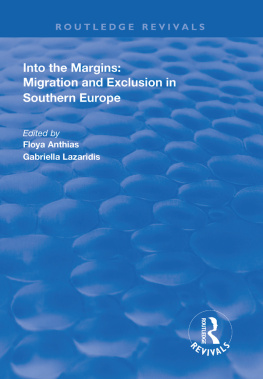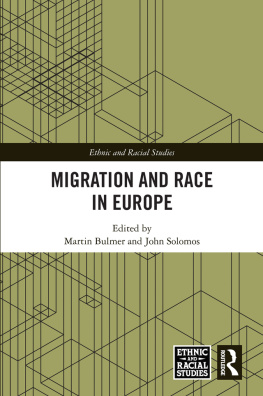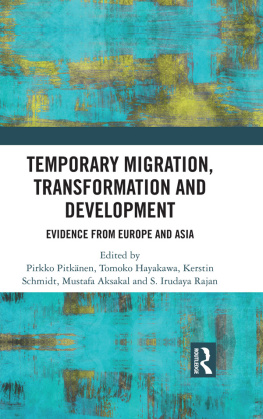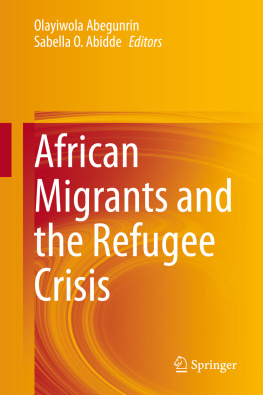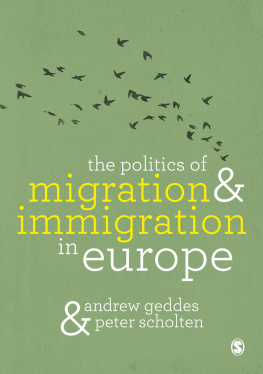EAST TO WEST MIGRATION
Research in Migration and Ethnic Relations Series
Series Editor:
Maykel Verkuyten, ERCOMER
Utrecht University
The Research in Migration and Ethnic Relations series has been at the forefront of research in the field for ten years. The series has built an international reputation for cutting edge theoretical work, for comparative research especially on Europe and for nationally-based studies with broader relevance to international issues. Published in association with the European Research Centre on Migration and Ethnic Relations (ERCOMER), Utrecht University, it draws contributions from the best international scholars in the field, offering an interdisciplinary perspective on some of the key issues of the contemporary world.
Other titles in the series
Transnational Social Spaces: Agents, Networks and Institutions
Edited by Thomas Faist and Eyp zveren
ISBN 0 7546 3291 1
Roma and Gypsy-Travellers in Europe: Modernity, Race, Space and Exclusion
Angus Bancroft
ISBN 0 7546 3921 5
International Migration Research: Constructions, Omissions and the Promises of Interdisciplinarity
Edited by Michael Bommes and Ewa Morawska
ISBN 0 7546 4219 4
East to West Migration
Russian Migrants in Western Europe
Helen Kopnina
Haarlem College and Amsterdam Fashion Institute, The Netherlands
First published 2005 by Ashgate Publishing
Published 2016 by Routledge
2 Park Square, Milton Park, Abingdon, Oxon OX14 4RN
711 Third Avenue, New York, NY 10017, USA
Routledge is an imprint of the Taylor & Francis Group, an informa business
Copyright 2005 Helen Kopnina
Helen Kopnina has asserted her right under the Copyright, Designs and Patents Act, 1988, to be identified as the author of this work.
All rights reserved. No part of this book may be reprinted or reproduced or utilised in any form or by any electronic, mechanical, or other means, now known or hereafter invented, including photocopying and recording, or in any information storage or retrieval system, without permission in writing from the publishers.
Notice:
Product or corporate names may be trademarks or registered trademarks, and are used only for identification and explanation without intent to infringe.
British Library Cataloguing in Publication Data
Kopnina, Helen
East to West migration: Russian migrants in Western
Europe. - (Research in migration and ethnic relations
series)
1.Russians - England - London - Social conditions
2.Russians - Netherlands - Amsterdam - Social conditions
3.Russians - Foreign countries - Ethnic identity 4. Russia
(Federation) - Emigration and immigration 5.Great Britain
Emigration and immigration 6.Netherlands - Emigration and
immigration
I.Title
305.8'91710421
Library of Congress Control Number: 2005933680
ISBN 9780754641704 (hbk)
As this book is based on the research done for my PhD dissertation, I want to thank my supervisor, Professor Caroline Humphrey, for being both critical and supportive and for making me review the ways of writing and thinking ethnographically. Special thanks to Cambridge University faculty members and students who had the patience to sustain my excitement and my struggles in writing this book. Thanks to Remco Oostendorp, Anita Sharman, Robbert Jan Roet for proofreading and commenting on parts of my book. The last two years of the publishing process felt lighter and more inspiring through the emotional and creative support of this books photographer and my partner, Engelbert Fellinger. Thanks to the support of my family without whom I would not have found the energy and discipline to finish this book. Last but not least, I thank all my informants without whom this research would not have been possible.
The objective of this book is twofold: to present an ethnographic account of Russians in London and Amsterdam, and to address some traditional anthropological topics, such as community, culture and ethnicity. I explore the concept of community through examining different aspects of the lives of Russian migrants in London and Amsterdam. My objective is to determine to what extent the Russians may be said to form communities. To this end, I explore the phenomenon of Russian invisibility in London and Amsterdam. This invisibility is caused both by external (relatively small numbers, geographical dispersion, etc.) as well as internal (social and cultural diversity, antagonism, etc.) factors. In this book I concentrate on the latter factors which reveal the way the community debate enters the migrants discourse.
By examining the body of theoretical work on community as well as analysing migrant interactions and conversations, I discovered that the term community is inadequate for describing the situation of the Russians both in London and in Amsterdam. Throughout the book, I argue that the Russian migrants are highly diverse, both socially and in terms of their views and adaptation strategies. They are also divided by mutual antagonisms, prompting most of them to reject their belonging to a community. I postulate that Russian migrant social structures can best be described through the concept of subcommunities, or groups based on social, ethnic, class, interest and other distinctions.
The concept of subcommunities is largely descriptive of the situation of Russians in London and Amsterdam, but is insufficient as an analytical tool for examining established theories in the fields of anthropology and migration. The discussion on subcommunities is thus further elaborated by chapters on the topics of social relations, informal economy, and cultural and ethnic identity in order to add analytical value and to establish relevance to a subcommunitys approach to the study of migrant groups.
I came to the conclusion that although Russians views may be described as contextual or shifting (dependent on the migrants membership of the subcommunities), community, culture, ethnicity, etc. are still seen by most as fundamental and self-evident categories. Throughout my book, I warn against embracing postmodern theories that present the migrants as cultural hybrids. I attempt to present an ethnography that describes Russians diverse circumstances and views, and simultaneously defends the legitimacy of the notions of community, culture and ethnicity deconstructed by postmodern theorists.
To my children Eve Madingley, Kai Tristan and the child about to be born
The Economist article entitled The Coming Hordes: Migration in the European Union, speaks of Eurosceptics, trade unions and some governments that fear that enlargement of the European Union will bring a stream of migrants from Eastern Europe chasing jobs and social security benefits ( The Economist , 2004: 25). On the other hand, the benefits of such migration are being praised. They can be seen as economic and political, as well as cultural, assets to the host countries. Such movements from east to west, whether feared or desired, are at the forefront of the social and political agendas of most West European countries. However, studies and predictions of large movements of people from east to west tend to be macro-scale and rarely address the grass-roots level situation of the migrants themselves. This can be partially explained by the fact that many new entries are undocumented or illegal migrants, and quantitative study methods are insufficient to reveal the how many and why and how of their presence in the country. This book addresses the issue of east to west migrants from the grass-roots perspective. It is based on case study and micro-analysis which reveals not only general trends in such migration, but also the details of migrants lives and circumstances.



